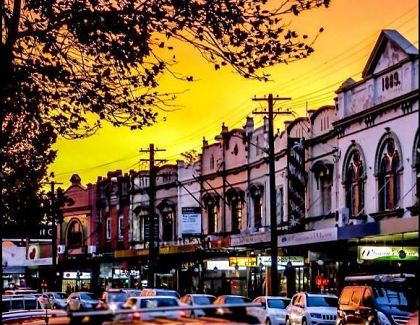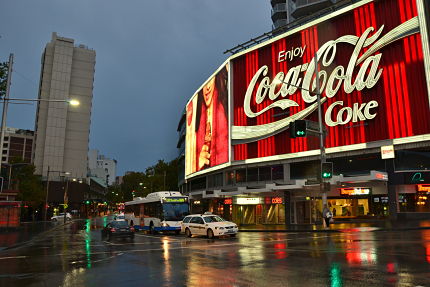
The night-time economies of suburbs like Newtown have boomed
since the lock-out laws were introduced, found the review.
NSW’s lock-out laws should be relaxed and bottle shops should close later, recommends an independent review into the state’s lock-out laws.
Yesterday (Tuesday) the government immediately released the results of the independent review into NSW’s liquor laws by retired judge Hon Ian Callinan QC.
In his review, Justice Callinan has suggested that the government considered making a few changes including:
- Giving people an extra hour to get to the bottle shop by extending the state-wide sale of takeaway alcohol from 10pm to 11pm.
- Relaxing the 1.30am lockout and 3am last drinks for live entertainment venues to a 2am lockout and 3.30am last drinks for a two-year trial period
- Extending the home delivery of alcohol from 10pm to midnight
The report, including its conclusions, is available here.
Justice Callinan’s conclusions included:
- There have been reduced admissions to hospital emergency departments because of the laws
- Police have been freed up to tackle non-alcohol related crime
- With the loss of some “vibrancy” of these areas, residents had reported that “squalid and sleazy behaviour had also fallen
- There was “no significant” displacement of alcohol-fuelled violence to other precincts
- The night-time economies of suburbs like Newtown and Double Bay and Bondi benefitted financially from the lock-out laws
But he also found that:
- Pedestrian traffic fell dramatically in the Sydney CBD and Kings Cross precincts
- Some venues had closed, although he says the reasons for these closures are “sometimes opaque”
- Some casual and shift workers had “probably” lost their jobs because of venue closures or reduced trading hours
- The lockout reduced opportunities to visit and revisit different venues, meet different people and enjoy different entertainment
- Some live entertainers had lost their jobs
- The value of the night-time economy, including other businesses such as food “may have been reduced”
Justice Callinan said: “Of all the groups holding opinions, it seems to me that the medical profession and the emergency workers have the least or no self-interest. Their opinion, formed on the frontline as it were, must carry a great deal of weight. On the other hand, autonomy of the individual and freedom of movement and choice are important aspirations.
“I have formed the view that the two Precincts at night were grossly overcrowded, violent, noisy, and in places dirty, before the Amendments, but that after them, they were transformed into much safer, quieter and cleaner areas.”
But he said that cutting off the sale of takeaway alcohol before 10pm made “little or no contribution to violence and anti-social behaviour in the Precincts” and home delivery even less so, recommending extending of the hours of sale of takeaway alcohol at licensed premises until 11pm and home delivered liquor to midnight.
Fans of live music will be rejoicing, although they will have to wait until the government makes its decisions on whether the recommendations should be implemented.
Justice Callinan has also suggested that “genuine entertainment venues” in the two precincts should be able to let patrons in until 2am and to continue to serve alcohol until 3.30am for a two-year trial period “so long as live entertainment is being generally continuously offered throughout the evening until then.”
The review was an exhaustive process with more than 1,800 submissions lodged and three round tables held where participants were asked their opinion on the state’s lock-out laws, which stipulate a 1.30am lock out and no alcohol served after 3am in the Sydney CBD entertainment and Kings Cross precincts.
The review was set up to consider the state-wide ban on take-away alcohol sales after 10pm, the freeze on new liquor licences in the precincts and periodic liquor licence fee laws, an annual scheme where the fee is based on a venue’s opening hours and risk levels.
The laws, which were introduced by then NSW Premier Barry O’Farrell in February 2014 after a string of one-punch assaults, continue to be a hugely emotive issue in NSW. There was a street protest against them in February when about 8000 marched through Sydney.
While police and medics have pointed to a significant drop in alcohol-fuelled violence since their introduction, businesses and patrons have complained the constraints they bring have killed Sydney’s nightlife and led to venues closing down, especially around the Cross.
There is a large cross-section of people and interest groups who have strong views on the legislation, including CBD and Kings Cross residents, who appear to be enjoying a quieter life and higher property values; live music venues; radio stations who say they have lost sponsors and local councils, who often straddle both camps.
Premier Mike Baird has been a staunch defender of the laws as they currently stand but the youth wing of his party, the Young Liberals, does not share his enthusiasm, claiming the restrictions have had a “deleterious effect” on Sydney’s night-time economy and culture.
Other supporters of the laws include The Last Drinks Coalition, made up of doctors, nurses, paramedics and police officers, suggested the measures be extended to all NSW venues to combat alcohol-fuelled violence.
The Coalition’s submission to the review said:
“Prior to the introduction of the modest alcohol laws in Sydney, emergency service workers were at breaking point, having to deal with constant and extreme levels of alcohol-fuelled violence.
“The measures have been proven to work in the greater Sydney CBD, so it is important other communities can now benefit from the decrease in alcohol-fuelled violence.”
Bbusinesses in the area came out and attacked the restrictions in their submissions.
CEO of Merivale Hotel Group Justin Hemmes said in his submission that rules should be based on venue size, not incident numbers. His Ivy Club in Sydney recorded the highest number of violent incidents (23) in NSW in 2015.
Hemmes also complained that the laws have stopped stars like Madonna, the late singer Prince and Drake from getting into some Merivale venues, saying: “Sydney’s reputation as an international dining and hospitality destination is being impacted by reports from tourists and celebrities of our ‘nanny state’ laws.”
You can read the background paper informing the review here.
Issues examined by the review included the impact of the laws on public safety, alcohol-related violence and anti-social behaviour; their impact on venue owners, operators and patrons of licensed venues and on related businesses, such as food, and the positive and negative community impacts.
It included an analysis of data – both statistical and from interviews and focus groups – on alcohol-related violence and anti-social behaviour, including data from the NSW Bureau of Crime Statistics and look at whether the laws have shifted drunk patrons and trouble to other suburbs, such as Newtown.
The Liquor and Gaming NSW provided technical and secretariat support to the review, which must occur within two years of the laws being introduced.
Comment below to have your say on this story.
If you have a news story or tip-off, get in touch at editorial@governmentnews.com.au.
Sign up to the Government News newsletter


My favourite newsagency closed, citing the lock-out laws and lack of midnight-to-dawn business. A bit unfair to me, as I never went there from midnight-to-dawn. Their business premises (a former supermarket) are empty, are now on sale and have been for months. Despite the size, no-one is interested. Like a lot of large business premises in Oxford Street, Sydney, that have been on sale for years. No-one wants to take the risk.
The concerns regarding the Casino, addressed within this document, relate specifically to the Star Casino.
There does not seem to be any comments on whether the new casino, which is certainly within the CBD area of Sydney, will or should have the same lockout laws.
Did I miss something on that?